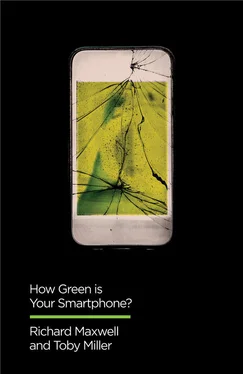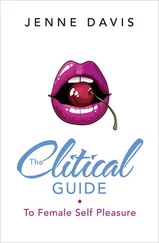1 Cover
2 Front Matter How Green is Your Smartphone? RICHARD MAXWELL AND TOBY MILLER polity
3 Introduction The Book You Hold in Your Hands Outsmart Your Smartphone The Greenest Smartphone is the One You Already Own Calling Bullshit on Anti-Science Propaganda
4 1 Outsmart Your Smartphone The Allure Are We Addicted? Distracted in Traffic What? I Wasn’t Paying Attention Buzzing Through Us and Messing with Our Natural Vibe The Cancer Question 5G and the Internet of Things – The Smog of Radiation Precautionary Principle
5 2 The Greenest Smartphone is the One You Already Own Energy Consumption and Carbon Emissions The Labor Process Part 1: Mining Hazards and Conflict Minerals The Labor Process Part 2: Manufacturing and Assembly The Labor Process Part 3: The Business Model The Labor Process Part 4: Our Global E-Waste Problem
6 3 Calling Bullshit on Anti-Science Propaganda Forewarned, Forearmed War-Gaming Science Shareholder Activism
7 Conclusion: What Next?End Dependence Break the Bonds of the Supply Chain: The Idea of the Fairphone Imbue Supply Chains with Compassion – 164 Years Later Optimism of the Intelligence, Optimism of the Will
8 References
9 Index
10 End User License Agreement
1 Cover
2 Table of Contents
3 Begin Reading
1 ii
2 iii
3 iv
4 1
5 2
6 3
7 4
8 5
9 6
10 7
11 8
12 9
13 10
14 11
15 12
16 13
17 14
18 15
19 16
20 17
21 18
22 19
23 20
24 21
25 22
26 23
27 24
28 25
29 26
30 27
31 28
32 29
33 30
34 31
35 32
36 33
37 34
38 35
39 36
40 37
41 38
42 39
43 40
44 41
45 42
46 43
47 44
48 45
49 46
50 47
51 48
52 49
53 50
54 51
55 52
56 53
57 54
58 55
59 56
60 57
61 58
62 59
63 60
64 61
65 62
66 63
67 64
68 65
69 66
70 67
71 68
72 69
73 70
74 71
75 72
76 73
77 74
78 75
79 76
80 77
81 78
82 79
83 80
84 81
85 82
86 83
87 84
88 85
89 86
90 87
91 88
92 89
93 90
94 91
95 92
96 93
97 94
98 95
99 96
100 97
101 98
102 99
103 100
104 101
105 102
106 103
107 104
108 105
109 106
110 107
111 108
112 109
113 110
114 111
115 112
116 113
117 114
118 115
119 116
120 117
121 118
122 119
123 120
124 121
125 122
126 123
127 124
128 125
129 126
130 127
131 128
132 129
133 130
134 131
135 132
136 133
137 134
138 135
139 136
140 137
141 138
142 139
143 140
144 141
145 142
146 143
147 144
148 145
149 146
150 147
151 148
152 149
153 150
154 151
155 152
156 153
157 154
158 155
159 156
160 157
161 158
162 159
163 160
164 161
Axel Bruns, Are Filter Bubbles Real?
Richard Maxwell and Toby Miller, How Green is Your Smartphone?
Milton Mueller, Will the Internet Fragment?
Neil Selwyn, Should Robots Replace Teachers?
Neil Selwyn, Is Technology Good for Education?
How Green is Your Smartphone?
RICHARD MAXWELL AND TOBY MILLER
polity
Copyright © Richard Maxwell and Toby Miller 2020
The right of Richard Maxwell and Toby Miller to be identified as Authors of this Work has been asserted in accordance with the UK Copyright, Designs and Patents Act 1988.
First published in 2020 by Polity Press
Polity Press
65 Bridge Street
Cambridge CB2 1UR, UK
Polity Press
101 Station Landing
Suite 300
Medford, MA 02155, USA
All rights reserved. Except for the quotation of short passages for the purpose of criticism and review, no part of this publication may be reproduced, stored in a retrieval system or transmitted, in any form or by any means, electronic, mechanical, photocopying, recording or otherwise, without the prior permission of the publisher.
ISBN-13: 978-1-5095-3473-9
A catalogue record for this book is available from the British Library.
The publisher has used its best endeavours to ensure that the URLs for external websites referred to in this book are correct and active at the time of going to press. However, the publisher has no responsibility for the websites and can make no guarantee that a site will remain live or that the content is or will remain appropriate.
Every effort has been made to trace all copyright holders, but if any have been overlooked the publisher will be pleased to include any necessary credits in any subsequent reprint or edition.
For further information on Polity, visit our website: politybooks.com
The Economist identified 2019 as “peak smartphone.” The “most successful consumer product in history” had reached four billion of the world’s five and half billion adults. Over 95 percent of Americans owned a cellphone, and smartphones comprised 77 percent of that total. The highest concentration was among educated 19 to 49-year-old city dwellers (Pew Research Center, 2018). South Korea topped the world’s list with 94 percent smartphone ownership, and the trend was similar throughout developed economies, with Japan, Germany, Italy, France, and the UK slowly catching up to US levels (Poushter, Bishop, and Chwe, 2018).
Cultural, social, economic, health, and ecological corollaries of peak smartphone have accompanied this expansion. Umberto Eco reimagines David Lean’s Dr Zhivago (1965) for our own times, recalling: “the tragedy of Zhivago, who after years sees Lara from the tram (remember the final scene of the film?), doesn’t manage to get off in time, and dies. Had they both had a mobile phone, would we have had a happy ending?” (2014, p. viii). The smartphone is a reassuring talisman: we may find ourselves one day on unfamiliar terrain, but can find our way out through its mapping functions. We may wander into a “dodgy” part of town, but can rely on it to communicate our whereabouts to loved ones or the state apparatus (Morley, 2017).
Meanwhile, the companies concerned revel in cell-phone saturation of the world’s ears, eyes, and fingers. Apple says “We believe everyone should be able to do what they love with iPhone.” 1Samsung invites customers to “meet our latest and greatest innovation” – its Galaxy S10. 2Google boasts that the Pixel 3 is “Everything you wish your phone could do.” 3That all sounds rather grand – stylish new phones that give us what we want. Trust Apple, trust Samsung, trust Google. But a 2019 report on the Mobile World Congress announced in a letter to “Dear Visionaries” that the industry was “suffering from a combination of split personality disorder and ADHD” (ABI Research for Visionaries/MWC 19 Barcelona, 2019). That diagnosis derived from the differing interests of two fractions of capital – phone manufacturers versus carriers. And there was no room in this world of visionaries for either party to consider whether their phones were green.
Читать дальше












